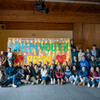Cindy and I began our ministry in my hometown of Los Angeles, California. Specifically, I was assigned as a young post-seminary pastor to be an associate at Lynwood Church. One of its dear members owned a vacation home in Princeville on the Island of Kauai and kindly offered us its use should we want to visit Hawaii. Of course we couldn’t say no!
My dad served in the Navy in World War II, mostly stationed in Pearl Harbor. His stories made me romanticize all things Hawaiian, and now finally we had the chance to go.
We have had several opportunities to return in the years following our initial visit, learning to love those canvases of God’s beautiful creation, always finding it easy to imagine the original paradise God had intended for our homes.
Each island has something special: Lanai has pineapple. Molokai has a leper colony. Oahu has the military and cultural history. The Big Island has volcanoes. Kauai has tropical jungles — and quickly became Cindy’s favorite.
But for me: give me Maui! It had it all — a volcano, tropics at Hana and the best beaches and snorkeling you could imagine. It even had a cute little town where early Christian missionaries had preached the truth of the gospel 200 years ago: Lahaina.
You can imagine where this is going. Lahaina, the gem of Maui, is gone, the victim of a hurricane-driven firestorm that literally burned it to the ground. Gone are the monuments of those missionaries, gone is the harbor, gone is the touristy Front Street. But most important and sad is the fact that hundreds of precious souls are gone, too.
You have probably seen the pictures of devastation. The power and rapidity of the firestorm itself was tragically awe-inspiring. It brings to my mind a similar tragedy which happened to another American paradise.
Just five years ago, the Camp Fire — named after Camp Creek Road where the fire originated — burned most of Paradise, California, to the ground. Over 18,000 buildings were destroyed, along with 85 people. Many stories of survival have been told wherein last-second decisions were why some escaped with their lives and some didn’t.
Once again I mention my dad. After divorcing my mom in 1962, he remarried and moved to Paradise where he lived for most of his remaining years. So Paradise was my second home and I spent many summers there. Paradise was well-named, as the lovely homes were built in the midst of a beautiful pine forest.
Dad died four years before the Camp Fire, so he never saw its devastation, but I had the opportunity to visit Paradise soon after the fire. I was shocked! It seemed there was no part of the town that wasn’t heavily damaged. Burnt cars were there by the hundreds, as people fleeing only took one of their two. Our large church was gone. All the homes Dad had lived in over the years were gone. It looked like a war zone.
I revisited all of those mental images when I saw the photos of the August 7–8 Lahaina fire. What particularly got me was the sight of those burned-out cars on Front Street. You could see the dramatic story they told of Hawaiians trying to drive north to safety along Front Street next to the ocean, stopped by the advancing fires ahead.
What were they to do? Seconds mattered; dozens of people chose to abandon their cars and jump into the waters. They stayed in the waters while their cars burned just a few feet away. And there they watched their town, their homes, their livelihood, their schools and churches perish. In a word, they watched their world destroyed, but they themselves were safe.
In the aftermath of this tragedy many are asking why there was no warning issued. Had there been more time to escape, many more people would have lived.
It isn’t hard to see spiritual lessons here. As we continue to live on this temporary home of a planet called Earth, one destined to be destroyed by a fire that will even “burn up the elements,” decisions are being made to survive that oncoming fire. But people who don’t know about this danger won’t have time to escape.
I see my duty as one who knows the end is coming to let the people I know and love know enough to prepare for it. If they do, God promises safety: “When you walk through the fire, you will not be burned; the flames will not set you ablaze” (Isa. 43:2).
If we can issue the warning with a “loud cry,” people will have time to make their decisions to leave the false security of the world and find true salvation in, what, the waters of baptism? Perhaps there is life to be found in nearby waters.









